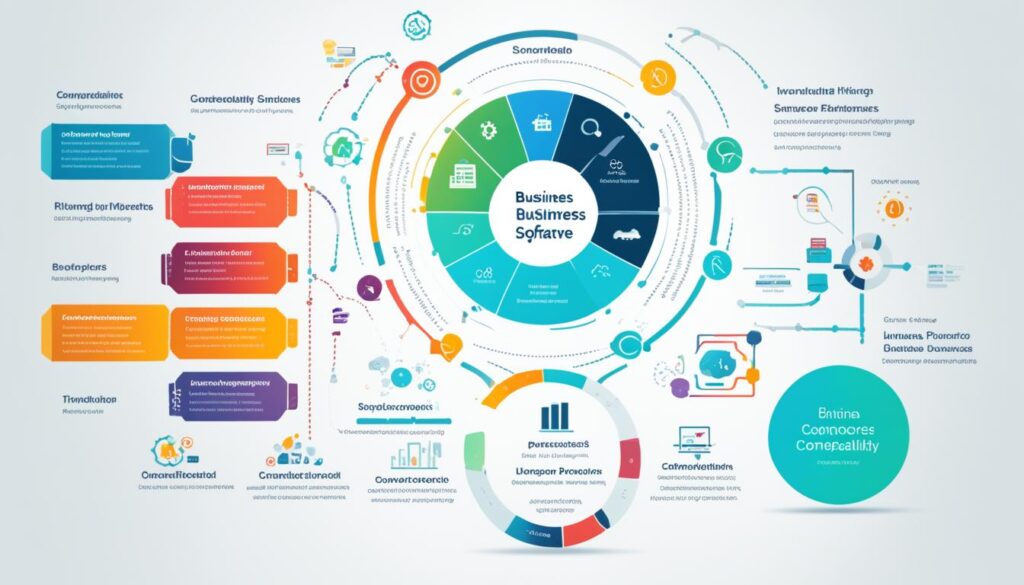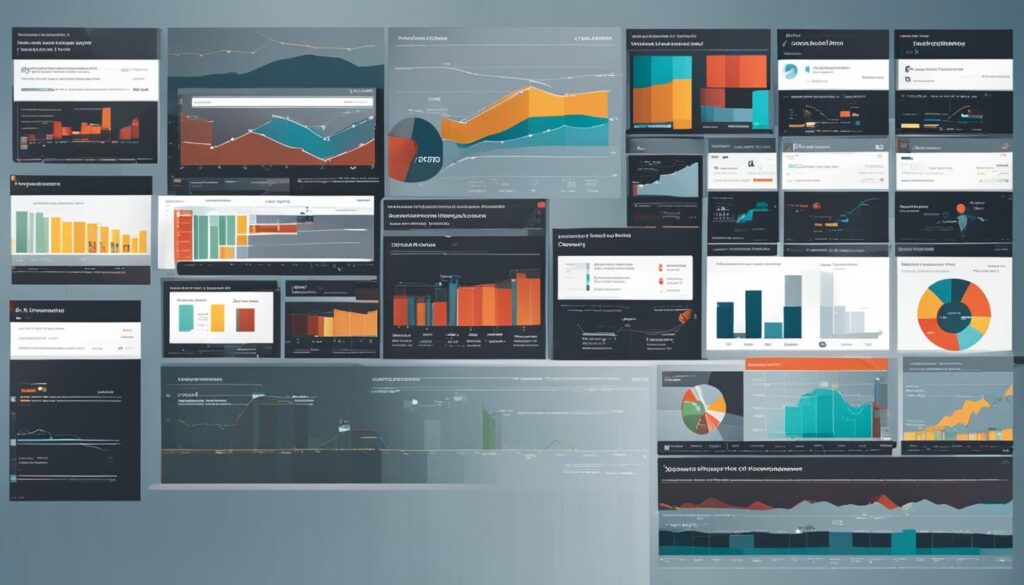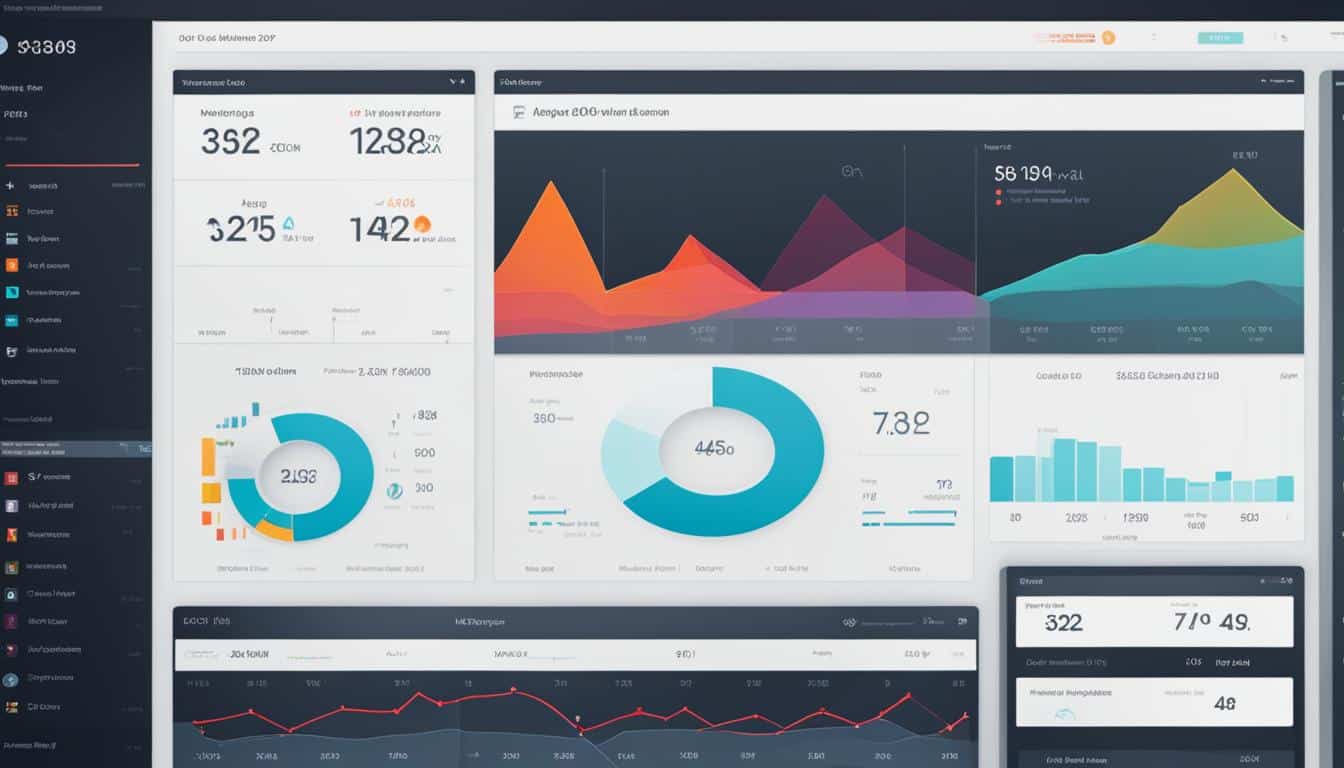Business intelligence software has become an essential tool for businesses looking to drive growth and gain a competitive edge in today’s data-driven world. With the help of advanced data analytics tools, businesses can transform raw data into valuable insights and actionable information, enabling them to make informed decisions and optimize their operations.
Business intelligence solutions encompass a wide range of tools, technologies, and practices that allow companies to collect, integrate, analyze, and present data in a meaningful way. By leveraging business intelligence software, organizations can unlock the power of big data and identify trends, untapped opportunities, and potential risks.
Implementing business intelligence software offers several key benefits. It accelerates decision-making processes, optimizes internal operations, increases operational efficiency, drives revenues, and provides a deeper understanding of market trends. With these advantages, businesses can make better-informed decisions, streamline processes, and position themselves for sustainable growth.
Key Takeaways:
- Business intelligence software enables businesses to transform raw data into valuable insights.
- Implementing business intelligence solutions accelerates decision-making and improves operational efficiency.
- Business intelligence tools provide a competitive edge by identifying market trends and untapped opportunities.
- Utilizing business intelligence software drives revenues and positions businesses for sustainable growth.
- Business intelligence software is a crucial tool for making informed decisions and optimizing operations.
What is Business Intelligence?
Business intelligence encompasses a combination of tools, technologies, applications, and practices that support businesses in collecting, integrating, analyzing, and presenting raw data to generate actionable insights. It involves processes such as data mining, analytical processing, querying, and reporting to transform data into valuable business information. By leveraging business intelligence, companies can make better data-driven decisions and uncover valuable insights from their data.
The Purpose of Business Intelligence

The primary purpose of business intelligence is to empower corporate executives, business managers, and operational heads to make data-driven decisions that drive success and growth. By leveraging the power of data, business intelligence enables organizations to gain valuable insights, optimize their operations, and identify opportunities for improvement. Let’s explore how business intelligence serves key purposes such as cost-cutting, identifying business opportunities, and spotting inefficient processes.
Cost-Cutting
Business intelligence plays a crucial role in helping organizations identify various cost-cutting opportunities. By analyzing data from different sources such as sales, procurement, and inventory management, businesses can uncover areas where expenses can be reduced or eliminated. Data-driven insights enable companies to optimize their spending, negotiate better deals with suppliers, and identify cost-efficient alternatives, ultimately leading to significant savings.
Identifying Business Opportunities
Business intelligence helps organizations identify potential business opportunities by providing insights into market trends, customer preferences, and emerging demands. Through data analysis, businesses can identify gaps in the market and discover untapped customer segments. These insights enable companies to develop targeted strategies, launch new products or services, and expand into new markets, thereby driving business growth and enhancing profitability.
Spotting Inefficient Processes
Effective business intelligence enables organizations to identify and rectify inefficient processes within their operations. By analyzing data on key performance indicators, companies can pinpoint bottlenecks, areas of low productivity, and inefficient workflows. Armed with this knowledge, organizations can streamline their processes, implement automation technologies, and optimize resource allocation to improve overall efficiency and effectiveness.
By harnessing the power of business intelligence, organizations can make informed decisions, drive growth, and achieve their strategic objectives. In the next section, we will explore the concrete benefits that businesses can derive from implementing business intelligence software.
The Benefits of Using Business Intelligence

Business intelligence (BI) offers numerous advantages to organizations in today’s data-driven landscape. By leveraging BI, businesses can enhance decision-making, improve operational efficiency, gain competitive advantages, and achieve sustainable growth.
Accelerated Decision-Making Process
One of the key benefits of using business intelligence is its ability to provide timely and accurate data for analysis. BI tools gather and consolidate data from various sources, enabling decision-makers to access real-time insights. This empowers them to make informed decisions swiftly, without relying on guesswork or incomplete information.
Optimized Operational Efficiency
Business intelligence helps streamline internal processes, eliminating inefficiencies and bottlenecks. By centralizing data and automating reporting tasks, BI promotes better resource allocation and improved workflow efficiency. It enables companies to identify areas for improvement, reallocate resources, and enhance overall operational performance.
Drive Revenues and Gain Competitive Advantages
Business intelligence enables companies to gain a competitive edge by identifying market trends and customer preferences. By analyzing data from various sources, businesses can uncover valuable insights into customer behavior and preferences, allowing them to tailor their products and services accordingly. This fosters customer loyalty, drives revenues, and positions businesses as market leaders.
Identify Market Trends and Opportunities
BI tools provide businesses with the ability to monitor market trends and identify emerging opportunities. By analyzing market data and competitor insights, businesses can proactively adapt their strategies and capitalize on new market trends. This helps businesses stay ahead of the curve and make informed decisions that drive growth and success.
Key Benefits of Business Intelligence
| Benefit | Description |
|---|---|
| Accelerated decision-making | Access to timely and accurate data for informed decision-making |
| Optimized operational efficiency | Streamlined processes, resource allocation, and workflow efficiency |
| Drive revenues and gain competitive advantages | Ability to identify market trends and tailor offerings to customer preferences |
| Identify market trends and opportunities | Proactively adapt strategies based on market insights and competitor analysis |
In summary, integrating business intelligence into business processes unlocks a multitude of benefits, from improving decision-making and operational efficiency to gaining competitive advantages and identifying market trends. By harnessing the power of business intelligence, organizations can thrive in today’s data-driven world and drive sustainable growth.
Smarter Decision-Making Process
Business intelligence is a powerful tool that allows business owners and managers to gain a clear understanding of their organizational data. By centralizing and structuring data in a single location, business intelligence makes it easy to access and analyze information in real-time. This empowers decision-makers to make smarter, fact-based decisions that drive business success.
Business intelligence tools, such as sales CRM systems, play a crucial role in this process. They provide key business metrics and insights that enable decision-makers to evaluate performance, identify trends, and make informed choices. By leveraging these tools, businesses can improve their financial performance and gain a competitive edge in the market.
Being able to access real-time and accurate data is essential for effective decision-making. Business intelligence allows decision-makers to have a comprehensive view of their company’s performance, enabling them to identify strengths, weaknesses, opportunities, and threats. With this information at their fingertips, they can confidently make decisions that align with the company’s goals and objectives.
“Data is a precious thing and will last longer than the systems themselves.”
– Tim Berners-Lee, Inventor of the World Wide Web
Timely and accurate data is the foundation for fact-based decisions. Business intelligence provides decision-makers with the information they need to evaluate different options and choose the best course of action. By relying on data rather than intuition or guesswork, businesses can minimize risks and maximize opportunities.
By implementing business intelligence solutions, organizations gain a competitive advantage by leveraging their data to drive better outcomes. From identifying patterns and trends to evaluating performance and forecasting future scenarios, business intelligence enables businesses to stay agile, proactive, and responsive.
Next, let’s explore how business intelligence plays a crucial role in improving customer service and enhancing customer satisfaction.
Improved Customer Service

Business intelligence plays a crucial role in enhancing customer service and driving customer satisfaction. By leveraging data and analytics, companies can gain valuable insights into customer behavior, preferences, and trends. This enables them to tailor their offerings and communication strategies to meet customer needs proactively.
A data-driven approach allows businesses to provide personalized customer experiences, increasing customer satisfaction and improving customer retention. With the help of business intelligence tools, such as customer relationship management (CRM) solutions, companies can track customer interactions and deliver exceptional customer service.
By utilizing the power of business intelligence, companies can:
- Understand customer preferences and anticipate their needs
- Segment customers and target personalized marketing campaigns
- Offer customized product recommendations based on individual preferences
- Improve response time and resolve customer issues quickly
By leveraging data-driven insights, businesses can provide seamless customer experiences, resulting in higher customer satisfaction and increased loyalty. This leads to long-term customer relationships and a positive brand reputation.
“Customer service shouldn’t just be a department; it should be the entire company.” – Tony Hsieh, former CEO of Zappos
Business intelligence empowers businesses to align their strategies with customer needs, ensuring they deliver exceptional customer service at every touchpoint. By leveraging data and insights, businesses can create relevant and personalized experiences, ultimately driving customer satisfaction and loyalty.
Key Benefits of Improved Customer Service Using Business Intelligence:
| Benefits | Description |
|---|---|
| Enhanced customer satisfaction | By providing personalized experiences that meet customer needs |
| Improved customer retention | By fostering long-term customer relationships through superior service |
| Increased customer loyalty | By delivering seamless experiences that exceed expectations |
| Positive brand reputation | By consistently providing excellent customer service |
Investing in business intelligence tools and strategies empowers businesses to deliver exceptional customer service that drives customer satisfaction, loyalty, and ultimately, business success.
Better Customer Knowledge

Customer knowledge is crucial for businesses to stay competitive in today’s market. To gain deep insights into customer behavior and engagement, businesses need robust business intelligence tools that provide comprehensive customer intelligence.
One such tool is a Customer Relationship Management (CRM) system, which integrates data from various departments such as sales, marketing, and customer service. This integration allows businesses to have a holistic view of their customers’ journey and behaviors. By analyzing this data, businesses can effectively segment their customer base, target personalized marketing strategies, and improve overall customer satisfaction and retention.
Customer Segmentation
Segmenting customers based on their preferences, behaviors, and engagement patterns can significantly enhance marketing efforts. With business intelligence tools, businesses can identify distinct customer groups and tailor their communication and offerings to each segment’s specific needs. This targeted approach increases the likelihood of customer engagement, conversions, and brand loyalty.
Personalized Marketing Strategies
Business intelligence provides valuable insights into customer preferences, allowing businesses to create personalized marketing strategies. By leveraging the data collected from CRM systems, companies can design targeted campaigns and offers that resonate with their customers on an individual level. Personalized marketing strategies not only result in higher customer engagement but also drive customer satisfaction and retention.
Improved Customer Satisfaction and Retention
By harnessing the power of business intelligence and leveraging customer intelligence data, businesses can prioritize and address customer needs more effectively. Understanding customers’ preferences, pain points, and interactions enables companies to improve their products, services, and overall customer experience. This continuous improvement leads to enhanced customer satisfaction and increased customer loyalty, reducing customer churn and driving long-term business success.
“The key to business success lies in understanding your customers better than anyone else.” – Richard Branson
An Example of Customer Intelligence
Table: Customer Segmentation Insights
| Segment | Characteristics | Marketing Strategy |
|---|---|---|
| Millennials | Young, tech-savvy, value convenience | Social media, mobile marketing campaigns with personalized offers |
| High-Value Customers | Frequent purchases, high lifetime value | Exclusive loyalty programs, personalized discounts, VIP treatment |
| Influencers | Active on social media, influential online presence | Collaborations, influencer marketing, referral programs |
By leveraging customer intelligence and implementing data-driven strategies, businesses can revolutionize their approach to customer engagement, ultimately leading to better customer experiences and increased business success.
Better Productivity
Business intelligence plays a crucial role in enhancing productivity by leveraging automation, refining business processes, and centralizing data. With the help of business intelligence tools, companies can streamline their operations and eliminate bottlenecks that hinder efficiency. By automating repetitive tasks and prioritizing daily activities, businesses can save time and allocate resources more effectively.
The automated reporting feature provided by business intelligence software allows senior management to access real-time information regarding contacts, deals, and other key business metrics. With intuitive dashboards, decision-makers can gain quick insights and make data-driven decisions to drive the performance of their teams and achieve operational excellence.
By centralizing data from various sources into a single repository, business intelligence enables easy access and analysis of information. This data centralization eliminates the need for employees to search for scattered data across different systems, saving valuable time and improving productivity.
In summary, business intelligence empowers businesses to optimize productivity through automation, refined processes, and centralized data. This enables employees to focus on value-added tasks, improves decision-making efficiency, and drives overall business performance.
Better ROI

Business intelligence software has a significant impact on the return on investment (ROI) of businesses. By leveraging data and gaining valuable insights, companies can improve sales efficiency, increase deal conversion metrics, and enhance the overall customer experience. Business intelligence enables businesses to make data-driven strategies and capitalize on growth opportunities, ultimately driving business growth and revenue generation.
Improved Sales Efficiency
With business intelligence software, companies can optimize their sales processes and improve efficiency. By analyzing data on customer preferences, behaviors, and buying patterns, businesses can identify the most effective sales strategies and allocate resources accordingly. This leads to more targeted and personalized sales efforts, ultimately increasing sales efficiency and productivity.
Enhanced Customer Experience
Business intelligence allows businesses to gain a deeper understanding of their customers. By analyzing customer data, businesses can identify pain points, preferences, and trends, enabling them to provide a more personalized and tailored customer experience. This leads to higher customer satisfaction and loyalty, ultimately driving repeat business and positive word-of-mouth.
Data-driven Strategies
Business intelligence empowers companies to make data-driven strategies across all aspects of their operations. By leveraging valuable insights from data analysis, businesses can make informed decisions and prioritize initiatives that have the highest potential for success. From marketing campaigns to product development, data-driven strategies enable businesses to allocate resources effectively and make decisions that drive growth and profitability.
In summary, implementing the right business intelligence tools can significantly improve the ROI of businesses. By leveraging data, enhancing sales efficiency, and adopting data-driven strategies, businesses can increase revenue generation, optimize operations, and achieve long-term growth. With the power of business intelligence, companies can make informed decisions that drive success in an increasingly data-centric business landscape.
Planning a Better Future for the Business

Investing in business intelligence software and skilled professionals allows businesses to strategically plan for a brighter future. With business intelligence tools at their disposal, companies gain valuable insights and information that inform their strategic planning and growth strategies.
By leveraging data, businesses can analyze their performance, identify trends, and make data-driven decisions for their future. Armed with this knowledge, companies can align their goals, make informed decisions, and set a clear path for long-term success and growth.
| Benefits of Planning with Business Intelligence | Strategies to Drive Growth |
|---|---|
| 1. Improved decision-making | 1. Market expansion |
| 2. Enhanced operational efficiency | 2. Product diversification |
| 3. Increased customer satisfaction | 3. Strategic partnerships |
| 4. Better ROI | 4. Innovation and research |
| 5. Talent acquisition and retention |
Improved decision-making:
“With business intelligence software, companies can analyze data and gain valuable insights that drive informed decision-making. By relying on data-driven decisions, businesses can optimize their operations, identify growth opportunities, and stay ahead of the competition.”
Strategies to Drive Growth:
- Market expansion: By using business intelligence to identify untapped markets, businesses can develop strategic plans for expanding their reach and acquiring new customers.
- Product diversification: By analyzing market trends and customer preferences, companies can identify opportunities for diversifying their product offerings to meet evolving consumer demands.
- Strategic partnerships: Leveraging business intelligence, companies can identify potential strategic partners to collaborate with, enabling them to access new markets, technologies, and customer segments.
- Innovation and research: With business intelligence, companies can gather insights about emerging trends, technologies, and customer needs, allowing them to invest strategically in innovation and research to stay ahead of the competition.
- Talent acquisition and retention: Business intelligence can help companies identify skill gaps and develop talent acquisition strategies to ensure they have the right people in place to drive growth and success.
By harnessing the power of business intelligence, businesses can plan for a better future, enhance their competitive edge, and position themselves for long-term success.
Conclusion
Implementing a business intelligence strategy can bring significant benefits to businesses. With the ability to improve decision-making, enhance operational efficiency, increase customer satisfaction, and achieve better ROI, business intelligence software is a valuable asset. However, businesses should be prepared to overcome implementation challenges to ensure successful adoption.
Challenges such as data quality, integration, cultural shift, and user adoption can hinder the effectiveness of a business intelligence strategy. Therefore, it is essential for businesses to define clear objectives and assess their data infrastructure before embarking on the implementation journey.
Moreover, businesses should strive to implement a data-driven culture within their organization. Encouraging employees to embrace data-driven decision-making and providing the necessary training and support can foster a more productive and efficient environment.
Lastly, it is crucial for businesses to regularly review and update their business intelligence strategy. By staying up-to-date with best practices and industry trends, businesses can continuously maximize the benefits of their business intelligence software and drive growth and success.
Also Refer : Business Risk Assessment: Strategies & Tips
FAQs
Q: What is business intelligence software?
A: Business intelligence software, or BI software, is a set of tools and applications that enable organizations to analyze and visualize their data to make informed business decisions.
Q: How can business intelligence software benefit my business?
A: BI software can benefit your business by providing valuable insights into your company’s performance, customer behavior, market trends, and more, allowing you to make data-driven decisions and drive growth.
Q: What are some popular business intelligence tools?
A: Some popular business intelligence tools include Power BI, Tableau, Sisense, Microsoft Power BI, Zoho Analytics, IBM Cognos, and SAP Business Objects, among others.
Q: How do I choose the right business intelligence tool for my business?
A: When choosing the right business intelligence tool, consider factors such as your specific data management and analytics needs, user-friendliness, availability of features like predictive analytics, and the tool’s ability to integrate with your existing data sources.
Q: Can non-technical users benefit from business intelligence software?
A: Yes, many BI tools available today are designed to be user-friendly and enable non-technical users, such as business analysts and stakeholders, to access and analyze data, often through self-service business intelligence features.
Q: What are the key features to look for in business intelligence software?
A: When selecting the right business intelligence software, consider features such as data visualization capabilities, data integration and management, connectivity to different data sources, and the ability to create interactive dashboards and reports.
Q: Is there a free trial available for business intelligence software?
A: Yes, many business intelligence software providers offer free trials so that you can evaluate the tool’s suitability for your business before making a purchase decision.
Q: How can business intelligence software help in data management?
A: Business intelligence software can help in data management by allowing users to consolidate and visualize business data from various sources, including spreadsheets, databases, and data warehouses, and enabling efficient data analysis and reporting.
Q: What role does business intelligence software play in making business decisions?
A: Business intelligence software plays a crucial role in making business decisions by providing insights and analytics that empower organizations to make informed strategic and operational decisions based on business data and trends.
Q: Are there BI tools available that specialize in self-service business intelligence?
A: Yes, some BI tools specialize in self-service business intelligence, empowering business users and analysts to access and manipulate data without requiring extensive technical expertise, enabling them to create their own reports and visualizations.













